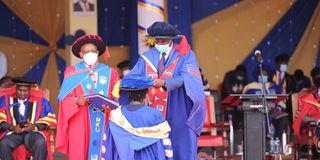Beating Covid-19: Two responses that have seen MKU get stronger
Sponsored by Mount Kenya University

By Evans Ongwae
Covid-19 has offered some powerful lessons Kenyans should pick to prepare for future pandemics, said Mount Kenya University (MKU) Chairman Prof Simon Gicharu.
He was addressing the university’s 18th Graduation, its first-ever virtual ceremony, necessitated by the Covid-19 pandemic safety protocols.
MKU graduated more than 4,200 students on October 9, with the graduands attending the ceremony and obtaining their certificates, diploma and degrees virtually. Even the Chancellor, Prof John Struthers, participated in the ceremony from Scotland, his home country.
The MKU founder said that against pandemics, “science-driven information and community engagement” were “our best tools.”
MKU was among the first institutions of higher learning to be given a clean bill of health by the Ministry of Education regarding compliance with the new Covid-19 rules.
When Covid-19 was declared a global pandemic and classroom learning in all schools in Kenya subsequently suspended, MKU responded immediately in two ways. It migrated its classes online. It also joined the global fight against the virus through science, innovation, community outreach and community education.
The university benefitted from its investment in information and communication technology (ICT) over many years. MKU is among the universities that pioneered online learning in Kenya.
As Prof Gicharu pointed out: “For many years, we have had a fully dedicated platform for online learning. This platform demonstrated our resilience and adaptability when we quickly transitioned our students from brick-and-mortar learning to online.“
MKU supplemented this with televised lectures aired on TV47. Parents, students and stakeholders praised this move.
“These televised lectures demonstrated our commitment to making education accessible to all,” said the MKU Chairman.
At the onset of Covid-19 and the government’s suspension of face-to-face teaching and learning, MKU retained a small, dedicated team of scientists, innovators and lecturers to spearhead the university’s contribution towards the fight against the spread of coronavirus.
In response to low supply of sanitisers, this team produced some at the MKU laboratories in Thika Main Campus, and ensured they were readily available to the community.
The team also developed Kenya’s first contact-tracing mobile application, and a ventilator made using locally-assembled materials. An MKU alumnus developed a device for sanitising library books.
In June, MKU’s focus on setting up hand washing stations in rural areas, in collaboration with the non-governmental organisation Partners for Care, won the duo the global University Innovative Civic Engagement Award by the US-based Talloires Network of Engaged Universities.
Prof Gicharu says lockdowns imposed to curb the spread of the virus showed that the country needs to expand community facilities such as social halls and playing fields. When Covid-19 struck, the inadequacy of such facilities, especially among urban communities, became evident. Children lacked playing facilities to explore their talents.
Prof Gicharu said Covid-19 pushed people to use technology more than ever before, and this has led to an explosion in the use of low-cost alternatives for meetings and conferences. The savings accrued from using them run into billions of dollars, he said.
He lauded the MKU campus in Rwanda for quickly complying with the directives from Ministry of Health and the Higher Education Council (HEC) of the Government of Rwanda. The campus has been fully re-opened, and physical learning is ongoing.
For a PDF copy of the MKU 18th graduation supplement, click here


